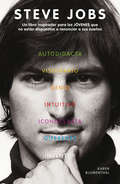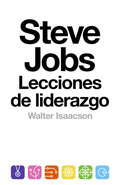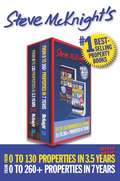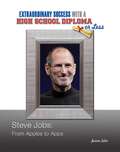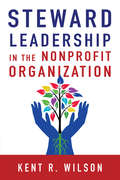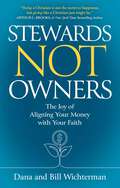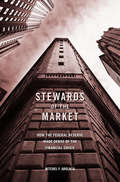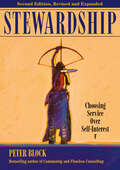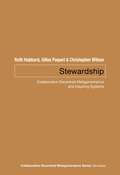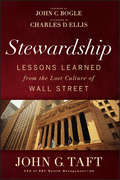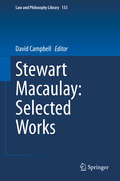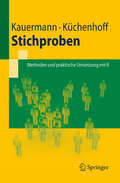- Table View
- List View
Steve Jobs: Leader Strategist
by David B. Yoffie Cynthia A. Montgomery"In 2009, Fortune magazine published one of its many cover stories on Steve Jobs, this time naming him the CEO of the decade. Explaining why they chose to bestow this honor on Jobs, Stephanie Mehta argued that “No business figure has crushed it the way Jobs has these past 10 years. Even as the rest of business boomed and then crashed, he resuscitated Apple, which, many forget, was in horrific shape at the dawn of the decade, and simultaneously radically reinvented the music, movie, and telecommunications industries.”
Steve Jobs: Leader Strategist
by David B. Yoffie Cynthia A. MontgomeryStrategically, Steve Jobs got it brilliantly right some times and terribly wrong other times. This case examines Jobs' development as a leader strategist over the course of his entire career. The successes and failures of Apple, NeXT, and Pixar are used to probe the role of strategy in organizational success and to examine a leader's distinctive responsibility to set (and reset) a viable course for a business. While Jobs' greatness may make him seem inaccessible at times, a closer look shows that some of his most valuable managerial capabilities were honed slowly, painfully, over time, and that there is much others can learn from his experience.
Steve Jobs: The Journey Is the Reward
by Jeffrey S. YoungSteve Jobs embarks on a new venture in Silicon Valley after resigning as Chairman with Apple Computers. He had to face hostilities from the management of the Apple Board in his new business. This book narrates his way to success.
Steve Jobs: Un libro inspirador para los JÓVENES que no están dispuestos a renunciar a sus sueños
by Karen BlumenthalAutodidacta, visionario, genio, intuitivo, iconoclassta, diferente, inventor. Steve Jobs, el hombre que pensaba diferente. Un libro inspirador para los JÓVENES que no están dispuestos a renunciar a sus sueños. Más que aparatos electrónicos, lo que Jobs dejó a los jóvenes fueron importantes lecciones de vida: un modelo de coraje, de iniciativa y de creatividad. Ésta es su historia, escrita de la manera que a ti te gustaría que te la contaran. La trayectoria de este genio, icono del siglo XXI, fue impredecible desde el inicio. Al nacer, fue dado en adopción, abandonó la carrera tras el primer semestre en la universidad... Sin embargo, con tan solo veinte años, creó Apple en el garaje de su casa junto con su amigo Steve Wozniack. Y así surgió su marca personal: una rigurosa búsqueda de perfección, un modo alternativo de acercarse a los problemas y un estilo que le llevó más allá de todo límite. Steve Jobs no solo te interesará por sus ordenadores, iPads e iPods, sino por cómo era y cómo vivió su vida: un visionario con un complicado carácter que resultó ser todo un ejemplo de lo que se puede conseguir si uno persigue sus sueños y permanece fiel a sí mismo. «No dejéis que el ruido de las opiniones de los demás ahogue vuestra propia voz interior. Tened el coraje de seguir vuestro corazón y vuestra intuición. De algún modo, ellos ya saben lo que realmente quieres ser. Vuestro tiempo es finito, no lo malgastéis viviendo la vida de otro»Steve Jobs Reseñas: [...] La biografía de Blumenthal, una mirada en profundidad a la vida de este visionario, se convierte en la favorita de cara al público más joven. Blumenthal, antigua periodista de economía, utiliza un discurso que dio Steve Jobs ante una promoción de estudiantes de Stanford como la puerta de entrada hacia la que atrae al lector. Steve Jobs contó al público una serie de historias sobre los incidentes más importantes de su vida. [...] Su última historia trataba del cáncer, y su mensaje fue: «seguid los dictados de vuestro corazón y vuestra intuición». Por medio de una serie de entrevistas originales, un uso inteligente de las fuentes y un estilo maravillosamente fluido, Blumenthal ofrece un completo retrato de Jobs con sus bien documentados defectos, su estética tan original y clarividente, y su disposición a presionarse a sí mismo y a los demás con el objetivo de lograr lo mejor según su percepción. [...] La exposición que se hace sobre la relación entre Apple y la compañía discográfica de los Beatles, Apple Corps., resulta entretenida e instructiva. Un libro inteligente de una autora inteligente sobre un individuo inteligente. Ilustrado con fotografías. Adjunta un glosario y sus fuentes. Ilene Cooper, Booklist
Steve Jobs: lecciones de liderazgo
by Walter Isaacson"Las personas que están lo suficientemente locas como para pensar que pueden cambiar el mundo son las que lo cambian". --Anuncio "Piensa diferente" de Apple (1997) Walter Isaacson, autor de la célebre biografía de Steve Jobs, nos explica las claves de liderazgo que convirtieron al creador de Apple en uno de los empresarios más exitosos del mundo.
Steve Kerr: Coaching the Golden State Warriors to Joy, Compassion, Competition, and Mindfulness
by Francesca Gino Jeff HuizingaSteve Kerr, coach of the 3-time NBA champion Golden State Warriors, reflects on his values-driven leadership style in the wake of a challenging season.
Steve McKnight's Complete Property Investing Set
by Steve McKnightSteve McKnight’s Complete Property Investing Set includes From 0 to 130 Properties in 3.5 Years (Revised Edition) Australia's highest ever selling real estate book, and From 0 to 260+ Properties in 7 Years. Scores of investors have used Steve McKnight's wealth building information to discover how to achieve their financial dreams. Now it's your turn and, for the first time ever, you can buy McKnight’s two bestselling titles in one handy volume. Using his incredible real-life account of how he firstly bought 130 properties in 3.5 years and went on to amass a property portfolio in excess of 260 properties within 7 years, McKnight reveals how you can become financially free by using cash and cashflow positive property. Benefit from Steve’s expert advice, gain an investing edge, avoid making huge losses and maximise your profits.
Steve Perlman and WebTV (A)
by James K. Sebenius Ron S. FortgangThe dynamics of a linked series of internal and external negotiations involved in launching, growing, and selling a high-tech, Internet start-up are explored. Steve Perlman unfurled an impressive new technology, recruited a top technical and management team, secured seed capital, laid the groundwork for later stages of financing, initiated alliances with content and Internet service providers, maneuvered into negotiation with major consumer electronics players Sony and Philips (for manufacturing and distribution), and ultimately had to decide on his strategy for possibly selling the firm. WebTV provided a low-cost, easy-to-use set-top box that linked televisions to the Internet, allowing users instant web access.
Steven B. Belkin
by Howard H. Stevenson Richard O. Von WerssowetzSteven Belkin, 26 years old and 2 1/2 years out of HBS, has decided to leave a group travel company he has run for the last year to start his own similar business. In the course of several months he has written a business plan, attracted several partners and employees, begun setting up the first tour they will offer, and approached venture capital firms and wealthy individuals to raise $250,000 in equity. He has not yet succeeded in finding investors. At the same time he has gone into personal debt to cover expenses. Now he must reconsider his financing strategy.
Steven Carpenter at Cake Financial
by Thomas R. Eisenmann Alison Berkley WagonfeldAfter investing $9 million of venture capital, Cake Financial had failed to reach critical mass. In early 2010 Cake's assets were sold and the company was dissolved. Founded in 2006, the San Francisco-based Internet company allowed users to monitor their investments and communicate with each other about their portfolio strategies. The case recounts key decisions made by founder and CEO Steve Carpenter, including several "pivots" -- shifts in business model, position, and strategy -- made by Cake's team in response to market feedback.
Stevenson Industries (A)
by John A. Davis Kacie LachapelleSimon Carlson, chairman of the board of his family's fourth-generation industrial company, must decide how to deal with his conflict with the company's nonfamily CEO. Hired by the board just 15 months earlier to pursue growth more aggressively, CEO Paul Steel has upset Carlson and several managers with his management approach with the very strained relationship between the chairman and CEO. The board must decide how it will deal with Steel and Carlson.
Stevenson Industries (B)
by John A. Davis Courtney J. SampsonSupplements the (A) case. A rewritten version of an earlier case.
Steve Jobs: From Apples to Apps (Extraordinary Success with a High School)
by Jaime SebaIn the last few decades, more and more people are going to college to further their education. It's hard to become a scientist, a professor, or a businessperson without getting some sort of college degree--but college isn't always necessary to achieve success. Some people are ready to enter the workforce right after high school. Steve Jobs was one of these people. The inventor and businessman changed the way the world uses technology with devices like the iPod, iPad, and iPhone. The company he helped found in a garage years ago is now one of the most successful companies in the world, and Jobs was the face of the technology giant right up until his death in 2011. Few people have changed the world as much in the twenty-first century as Steve Jobs. And what's most amazing about his story is that he did it all without a college degree!
Steward Leadership in the Nonprofit Organization
by Kent R. WilsonMost approaches to nonprofit organizational leadership are borrowed from the for-profit sector. But these models are often inadequate to address the issues nonprofit leaders face. We need a new framework for nonprofit management that is rooted in historical precedent and biblical principles yet is also appropriate for the nonprofit context. Nonprofit consultant and researcher Kent Wilson presents a comprehensive model for steward leadership, in which leaders act as stewards or trustees, never as owners. Scripture and history give concrete examples of stewards who manage resources on behalf of others for the good of others. Wilson applies this classical understanding of the steward to modern organizational management, defining and developing steward leadership as an alternative to its cousin, servant leadership. Steward leadership offers great hope for the transformation and effectiveness of nonprofit leadership for stakeholders, board members, executive directors and staff members. Designed by a nonprofit leader for nonprofit leaders, this fresh approach to leadership gives you a new focus to lead your organization with excellence.
Steward's Fork: A Sustainable Future for the Klamath Mountains
by James K. AgeeThe book explores northwest California's magnificent Klamath Mountains--a region that boasts a remarkable biodiversity, a terrain so rugged that significant landscape features are still being discovered there, and a wealth of natural resources that have been used, and more recently abused, by humans for millennia.
Steward's Pocket Reference And Diary
by Union Comunication ServicesThe Steward's Pocket Reference & Diary is designed to be a quick reference for stewards and is an ideal companion to the more comprehensive Union Steward's Complete Guide, also available from UCS. The Pocket Reference is a handy tool you can keep in your pocket or bag for quick access to basic information as well as for recording information on workplace incidents and notes.
Stewards Not Owners: The Joy of Aligning Your Money with Your Faith
by Bill Wichterman Dana WichtermanThe book Stewards Not Owners goes beyond beyond the traditional Christian concept of tithing—giving 10% of our income—to encourage readers to consider a new paradigm, that everything—our time, talents, treasures, relationships—belong to the Lord, but they are still ours for us to use with joy and creativity.Stewardship is a word we don&’t hear very often . . . until our church needs to build a new building. But does Scripture say more about stewardship than that? Is there more to managing our money for God&’s kingdom than we realize? In Stewards Not Owners, Dana and Bill Wichterman challenge conventional views on wealth and giving, encouraging Christ-followers to put all their financial muscles to work for the Lord. Rather than focusing on simply giving away 10 percent of their income, Dana and Bill challenge readers to activate 100 percent of their wealth and wealth-creating potential for kingdom goals. The Wichtermans also reveal: How to incorporate your faith into your financial decisions. Why God calls us to save while cautioning us against hoarding. The need for financial openness and transparency in our faith communities. How faithful Christians are inadvertently funding companies and initiatives that actively work against biblical values. How to creatively use your charitable giving to build Christ-centered businesses. Strategies for aligning your personal wealth-building goals with your heavenly calling to expand God&’s kingdom. Drawing on years of personal research, relationships, and experience, Dana and Bill also share the inspiring stories of twenty-four individuals who have fully embraced a lifestyle of radical stewardship. Surrendering all your finances to God doesn&’t have to mean living a dull, joyless, ascetic life. As you&’ll discover in Stewards Not Owners, you can enjoy God&’s financial blessings while still using them to expand His kingdom and lead a life of true abundance and eternal significance!
Stewards of the Market: How the Federal Reserve Made Sense of the Financial Crisis
by Mitchel Y. AbolafiaMitchel Abolafia goes behind the scenes with the Federal Reserve’s powerful Open Market Committee as it responded to the 2008–2009 financial crisis. Relying on verbatim transcripts of closed meetings, Abolafia shows how assumptions about self-correcting markets stymied the Fed and how its leaders came to embrace new ideas.
Stewardship: Choosing Service Over Self-Interest
by Peter BlockOne of the most provocative and revolutionary books written on leadership, business, and organizational design, Stewardship remains just as relevant, even twenty years later, to transforming our organizations for the common good of the wider community. We still face the challenge of fostering ownership and accountability throughout our organizations. Despite all the evidence calling for profound change, most organizations still rely on patriarchy and control as their core form of governance. The result is that they stifle initiative and spirit and alienate people from the work they do. This in the face of an increasing need to find ways to be responsive to customers and the wider community. Peter Block insists that what is required is a dramatic shift in how we distribute power, privilege, and the control of money. "Stewardship," he writes, "means giving people at the bottom and the boundaries of the organization choice over how to serve a customer, a citizen, a community. It is the willingness to be accountable for the well-being of the larger organization by operating in service, rather than in control, of those around us." Block has revised and updated the book throughout, including a new introduction addressing what has changed—and what hasn't—in the twenty years since the book was published and a new chapter on applying stewardship to the common good of the wider community. He covers both the theory of stewardship (in particular how it ameliorates the shortcomings of traditional leadership) and the practice (how it transforms every function and department for the better). And he offers tactical advice as well on gearing up to implement these reforms.
Stewardship: Collaborative Decentred Metagovernance and Inquiring Systems
by Gilles Paquet Ruth Hubbard M Christopher WilsonThis book is the first in a series of books is designed to define cumulatively the contours of collaborative decentred metagovernance. At this time, there is still no canonical version of this paradigm: it is en émergence. This series intends to be one of many construction sites to experiment with various dimensions of an effective and practical version of this new approach. Metagovernance is the art of combining different forms or styles of governance, experimented with in the private, public and volunteer sectors, to ensure effective coordination when power, resources and information are widely distributed, and the governing is of necessity decentred and collaborative. The series invites conceptual and practical contributions focused on different issue domains, policy fields, causes célébres, functional processes, etc. to the extent that they contribute to sharpening the new apparatus associated with collaborative decentred metagovernance. In the last few decades, there has been a need felt for a more sophisticated understanding of the governing of the private, public and social sectors: for less compartmentalization among sectors that have much in common; and for new conceptual tools to suggest new relevant questions and new ways to carry out the business of governing, by creatively recombining the tools of governance that have proved successful in all these sectors. These efforts have generated experiments that have been sufficiently rich and wide-ranging in the various laboratories of life to warrant efforts to pull together what we know at this stage. This first volume in the series attempts to scope out, in a provisional way, the sort of general terrain we are going to explore. It is not meant to impose boundaries or orthodoxies, but only to loosely identify the horizons and the frontiers, as we perceive them at the time of launching this journey. Horizons and frontiers are to us not ways to limit the inquiries, but rather invitations to all forms of transgression.
Stewardship: Lessons Learned from the Lost Culture of Wall Street
by Charles D. Ellis John G. TaftA compelling argument for why stewardship of wealth and service to others should be our highest financial priority Stewardship is the journey of financial insider John Taft towards understanding and affirming the importance of stewardship—which he has come to define as "serving others"—as a core principle for the financial services industry, the global financial system, and society at large. By defining the attributes of authentic stewardship, this book presents a path forward by analyzing the success of Canadian banks in weathering the financial crisis; evaluates the effectiveness of global financial reform efforts in making the financial system safer, sounder, and more secure; offers wealth management prescriptions for individual investors; evaluates the potential of ESG (environmental, social, and governance) investment processes as a way to instill stewardship behaviors among corporate CEOs (particularly at financial services firms); and, ultimately, calls for a return to stewardship's core principles as the key to not only minimizing the scope and consequences of future failures, but also to addressing other societal challenges. Argues for a return towards stewardship, with financial services companies doing right by their customers Analyzes the response of Canadian banks to the financial crisis to provide meaningful advice for investors and businesses alike Inspired by Taft's experience running one of the largest wealth management firms in the country during the financial crisis and his direct participation in subsequent legislative and regulatory efforts to rewrite the rules under which the U.S. securities industry operates From the man who made the decision to reimburse clients affected by the collapse of a money market mutual fund comes a compelling look at why financial service companies should start doing what's right for their customers.
Stewart Macaulay: Selected Works (Law and Philosophy Library #133)
by David CampbellThis book represents a unique resource about Stewart Macaulay one of the common law world’s leading scholars of the law of contract and of the law in action approach to the study of law. Since 1959, he has published over 50 articles in leading journals, a number of working papers, (with colleagues at the University of Wisconsin Law School) a pathbreaking casebook for the teaching of the law of contract, and (with other colleagues) equally pathbreaking collections of materials for the teaching of the law in action or law in context approach to the study of law. In this work Macaulay has established himself as one of the postwar world’s leading scholars of the law of contract and of the sociology of law. His work is an absolute reference point in both disciplines, and it has attracted great attention elsewhere, most notably in economic sociology, where his concept of non-contractual economic relationships is regarded as an important theoretical innovation. Macaulay’s work has become an object of commentary in its own right, and the proposed book is intended to assist further such commentary by making hitherto difficult to obtain works readily accessible. Most of Macaulay’s work is now, when the leading journals are generally available in electronic form, readily accessible to students and researchers in universities. There are, however, a number of interesting and in most cases important works published in less accessible journals or works which were not published in an electronic form, which are difficult to obtain. This book will make them readily available, and in so doing will make it possible in future for scholars to have Macaulay’s complete oeuvre readily to hand. Although Macaulay’s work has provoked very considerable discussion, there previously have been no overall accounts of that work as opposed to critical engagements with aspects of it. In this book, two additional essays by leading commentators give accounts of Macaulay’s work and provide an introduction to, exegesis of and general evaluation of Macaulay’s work as a whole which is not to be found in the existing literature.
Sthool Arthashastra Second Semester FYBA New NEP Syllabus - SPPU: स्थूल अर्थशास्त्र दुसरे सत्र एफ.वाय.बी.ए. नवीन एन.इ.पी. अभ्यासक्रम - सावित्रीबाई फुले पुणे यूनिवर्सिटी
by Dr G. N. Jhamare‘स्थूल अर्थशास्त्र' (Macro Economics) हे प्रा. जी. एन. झामरे यांनी लिहिलेले आणि पिंपळापुरे अँड कं. पब्लिशर्सने प्रकाशित केलेले पाठ्यपुस्तक आहे. हे पुस्तक विशेषतः नवीन शैक्षणिक धोरण (NEP) २०२० अंतर्गत, सावित्रीबाई फुले पुणे विद्यापीठाच्या बी. ए. प्रथम वर्ष (सेमेस्टर - II) च्या शैक्षणिक सत्र २०२४-२५ च्या अभ्यासक्रमानुसार तयार करण्यात आले आहे. अर्थशास्त्र हा विषय क्लिष्ट वाटू नये म्हणून, लेखकाने विविध संकल्पना अत्यंत सरळ, सोप्या भाषेत व दैनंदिन व्यवहारातील उदाहरणांसह मांडण्याचा प्रयत्न केला आहे. हा ग्रंथ चार प्रमुख घटकांमध्ये विभागलेला आहे. पहिला घटक स्थूल अर्थशास्त्राची ओळख, व्याप्ती आणि राष्ट्रीय उत्पन्नाच्या विविध संकल्पना व मापन पद्धती स्पष्ट करतो. दुसऱ्या घटकात मुद्रा (पैसा), तिची कार्ये , मुद्रेच्या मूल्याचे सिद्धांत (जसे फिशरचा रोख व्यवहार दृष्टिकोन आणि केंब्रिजचा रोख शिल्लक दृष्टिकोन) , तसेच मुद्रास्फिती (Inflation) व मुद्राअपस्फिती (Deflation) यांची कारणे, प्रकार, परिणाम व नियंत्रण उपाय यांचा समावेश आहे. तिसरा घटक 'व्यापार चक्र' (तेजी, घसरण, मंदी, पुनरुत्थान) आणि 'रोजगारीचे सिद्धांत' , ज्यात 'से'चा बाजार नियम आणि केन्सचा प्रभावी मागणीचा सिद्धांत यांचा सखोल अभ्यास आहे. चौथा घटक 'सार्वजनिक आयव्यय' (Public Finance) वर केंद्रित असून , यात सार्वजनिक उत्पन्न (उदा. प्रत्यक्ष व अप्रत्यक्ष कर) , सार्वजनिक खर्च (तत्त्वे व परिणाम) आणि महत्तम सामाजिक लाभाचे तत्त्व यांचे विश्लेषण केले आहे.
Stichproben
by Göran Kauermann Helmut KüchenhoffDas Buch führt in Grundprinzipien der Stichprobenziehung und der zugehörigen statistischen Auswertung ein. Dabei stehen Motivation und anschauliche Beschreibung der Verfahren im Vordergrund. Nach einer generellen Einführung werden sowohl modellbasierte als auch designbasierte Stichprobenverfahren wie Clusterstichprobe und geschichtete Stichprobe entwickelt. Jedes Kapitel wird mit der Umsetzung der Verfahren mit dem Programpaket R abgeschlossen. Hierdurch werden die Leserin und der Leser in die Lage versetzt, selbst komplexe Stichprobenverfahren direkt in R umzusetzen. Ein Ausblick auf weitere Verfahren und praktische Probleme schließt jedes Kapitel des Buches ab.

